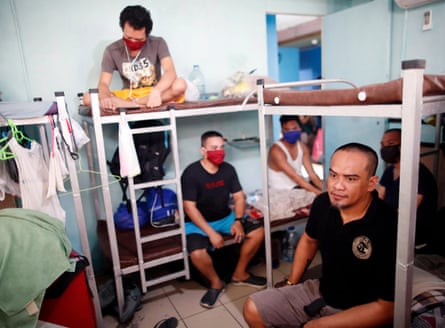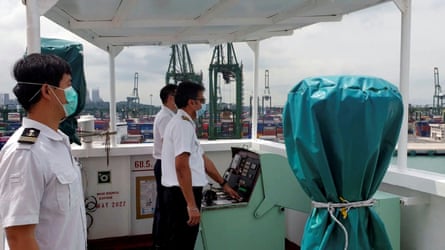According to a Guardian report written by Karen McVeigh , working in a cargo ship is a ‘Ticking time bomb’ as contracts aren’t honoured and ports stop crews going ashore even for urgent medical care
Stuck Onboard As Ship Crisscrosses Ocean
Thomas Stapley-Bunten was due to finish his contract aboard a huge cargo ship carrying liquid natural gas early last month. The ship docked at the LNG terminal in Fos Cavaou, southern France, as planned, but by then the world was in coronavirus lockdown. He couldn’t disembark, and international flights were grounded, preventing him from getting home to Newcastle, UK.
So the 27-year-old former Royal Navy warfare officer has been stuck onboard as the ship criss-crosses the ocean from Qatar to Turkey and France and back.
The 34-man crew, from the Philippines, India, Russia and Ireland, have had their pay increased by 50%, but they just want to go home.
Prisoners Of Coronavirus?
“We are still loading, sailing and discharging our cargo. But in the back of our minds, we are starting to realise: we are trapped. People are essentially prisoners,” he said. “There is no way to get off the ship.”
No End To Contracts
Stapley-Bunten is one of 150,000 seafarers stranded at sea on their vessels, forced to work beyond their contracts indefinitely, often seven days a week. Many have families and don’t know when they will see them again. They have been given no choice but to keep going, from port to port, unloading at docks that are open for cargo but closed to the seafarers who deliver it.
Cargo ships are responsible for delivering as much as 90% per cent of the global trade in goods, and the world’s 1.2 million seafarers are a resilient workforce, operating in often dangerous conditions, seven days a week.
Britain, Spain and the Netherlands have designated them key workers during the health crisis. But they are being stretched to the limit: working beyond their contracts, exhausted, under stress, and invisible to the governments that rely on the goods they carry.
No Emergency Treatments
The International Transport Workers’ Federation (ITF) has received multiple reports of crew members with life-threatening conditions who have been refused emergency treatment at ports, despite the illnesses being unrelated to Covid-19.
Unions and shipping and maritime organisations warn of a health and safety crisis.
They are lobbying governments to lift restrictions to allow crew members home, but so far with little success.
Many governments are making huge efforts to ensure cargo continues to be delivered safely. But there is no similar effort to help seafarers. The European commission has issued guidelines to facilitate the safe movement of seafarers and shipping companies, suggesting key ports – including Singapore, Rotterdam, Gibraltar and Hong Kong – where crew changes could take place safely.
But unions have said port states and governments are not responding.
“Governments are managing to get their citizens home from abroad, passengers from cruise liners, yet there are 150,000 seafarers still out there, working to keep global supply chains open, who can’t get home,” Mark Dickinson, general secretary for Nautilus International, the maritime union, said.
“The EU, the International Transport Workers’ Federation, the International Labour Organization, are saying please get these seafarers home, but individual governments are not pulling their weight. It is becoming a health and safety crisis and it’s getting worse by the day.”
Concerns of Fatigue & Depression
Kees Wiersum, captain of a Dutch-flagged specialised cargo ship currently sailing off the coast of Madagascar, said he is concerned about “fatigue and depression”among his 21-man, mainly Filipino, crew.
“They are in contact with their families, but if something happens, they can’t do anything,” said Wiersum. “We are trying to keep their spirits up, but they will tell you their families need them home. Some of them are expecting babies and they can’t get home for the births.”
Even if they were repatriated to the Philippines, one of the largest suppliers of seafarers in the world, they would face the additional obstacle of overcrowded quarantine facilities in Manila.

Filipino seafarers stranded amid the coronavirus pandemic rest inside a dormitory in Manila. Photograph: Francis R Malasig/EPA
Heroes Treated As Criminals
“Our minister of transport calls us heroes. He said we are vital for the economy,” said Wiersum, 61, a Dutchman who has spent 43 years at sea. “But we are treated like pariahs, like criminals. We can’t go ashore for a walk or a beer, or even for medical help. In Holland, they have repatriated holidaymakers all over the world. But they forgot about us.”
One of the most pressing problems is that seafarers are not being afforded the usual rights to get medical treatment at ports. Fabrizio Barcellona, from the seafarer section of the ITF, said he was receiving 10–15 reports of medical emergencies a day, and those are “just the ones we know about”.
Forced Work, Risks Accidents
The strain of being forced to work long beyond the end of your contract also increases the risk of accidents, seafarers say.
Andrewi Kogankov, 47, from St Petersburg, Russia, has been captain aboard the Spetses Lady oil tanker since November. His contract ran out in March, but the planned crew change in Qatar was cancelled due to the lockdown, forcing him to continue sailing. His contract has now been extended for two months.
“We are feeling exhausted,” Kogankov said. “We are working 24/7, we have a tough schedule, handling dangerous cargo. You have to be careful, you have to concentrate. When you are six, seven months on board, thinking about your family, you can lose your concentration.”
Without Crew Change Trade Will Halt
This week the International Maritime Organization warned its 174 member states that trade and global supply chains would “come to a halt” unless crews on ships can be replaced. If the 150,000 seafarers estimated to be working beyond their contracts are not relieved of their duties in two weeks, they will be in breach of maritime regulations.

Crew wear face masks on a Pacific International Lines ship in Singapore. Photograph: Pacific International Lines/Reuters
Several groups – including the ITF, International Chamber of Shipping and the International Air Transport Association – have proposed a 12-step protocol to allow seafarers to join or leave ships at a series of “repatriation hubs”, from where they could fly home.
Stephen Cotton, general secretary of the ITF, said: “Our message for governments is clear: you cannot continue with a mentality of out of sight, out of mind, and we strongly urge governments to act now before we suffer more serious human or environmental consequences.”
Guy Platten, general secretary of the International Chamber of Shipping, described the plight of seafarers as a “ticking timebomb”.
“We could start to see disruption to trade, and more importantly we risk accidents and mental health issues. Putting this off is no longer an option.”
Did you subscribe to our daily newsletter?
It’s Free! Click here to Subscribe!
Source: The Guardian

















